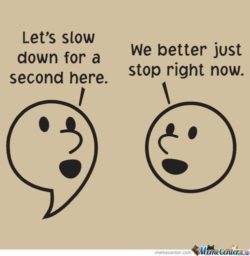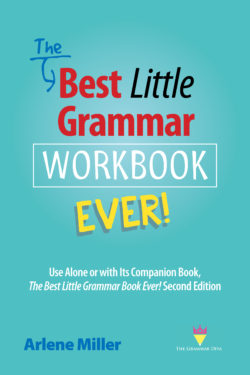
September 24th
September 24 is National Punctuation Day so I thought I would write this weeks post using no punctuation just to prove how important punctuation is the primary purpose of punctuation is to make writing clearer by showing us where we stop where we pause where we are asking a question and where we are exclaiming something and of course when we are directly quoting someone punctuation has been in the news lately because of texting common thought is that a period at the end of a text changes the tone of the text to one that is less friendly than probably intended I just decided to eliminate capital letters to begin sentences in this blog post because if there is no period there is no capital letter required of course I am keeping the capital I in the pronoun I because well that is just the way it is done I personally like punctuation especially the semicolon which many people dont like to use because maybe they are uncomfortable using it it really isnt very confusing and has far fewer rules than lets say commas which have about a zillion rules the main rule of using commas is to always have a reason to use one this can be a little complicated because the final rule of commas is to use one wherever not using one would cause confusion so I guess that one is pretty much up to the writer
one of the longstanding controversies about commas is whether or not to use one after the last item in a series of three or more that comma usage is called the Oxford comma its use has been bandied about for years and goes in and out of style I don’t know if it is currently in or out but I always use it it often clears up confusion such as in the sentence I am not voting for Jill Stein the doctor and the Green Party candidate is that a good example well it will have to do for now it will be difficult to understand since there is no punctuation here at all anyway
I hope we all appreciate the importance of punctuation for example the elimination of a single comma can be fatal as in the case of lets eat grandma and don’t worry even though I burned the roast we will eat my children
many people are really fond of a particular punctuation mark for me as I said it is the semicolon which is difficult to overuse however people do overuse punctuation marks such as the exclamation point and the dash many writers just love to use the long dash over and over again and the same is true of the exclamation point which should be used very sparingly and never twice in a row additionally please don’t end a sentence with a question mark and an exclamation point you will have to choose one or the other
I have read this blog post over and i actually didn’t have much trouble figuring out what it said but maybe that is because I wrote it in that case maybe punctuation isnt as important as we think it is maybe we should just eliminate it and while we are at it perhaps we should eliminate all vowels as well because it seems that people have no trouble reading something when all the vowels are lmntd
could you read that last word in the previous paragraph the one where the vowels have been lmntd well that is about all I have to say about punctuation for now so you can decide whether or not you want to use it any longer I would advise that you continue to use it just in case
Happy National Punctuation Day!!!!!!!!!
Coming soon to Amazon and all other online retailers in paperback! (e-book coming too!)




One important note: I understood exactly what you were writing even though no punctuation. The missing periods made the read a bit difficult, but the missing commas, not so much. I’m looking forward to the day when we can eliminate most of the commas I fight with every day. The rules seem excessive concerning them. Whatever happened to common sense? None of the editors I’ve work/ed agree on every rule, to the point they make my head spin. Thanks for all you teach, Arlene.
You are welcome, and I do agree with you. The job of punctuation is to make things clear to read. Most of the commas that we use — for a reason — are really not necessary to understand the text. I don’t know the answer…especially since I like to follow the rules and use commas where I know they hsould be according to the standards.
Your article was fun to read, despite the missing punctuation. That omission made it a little difficult to read, though. Regarding the use of commas, I do believe that, in most cases, they do have a role to perform so I use them and try to use them right.
Since you are an English language expert, and I am not because English is my second language, I would like to consult you on” double consonants” at the end of a line. I was taught, when I was in Advanced English classes that you always split them, i.e., the first of them remained at the end of the line and the second, was written/typed on the next line. Is this still true or have the rules changed?
I am aware this is not the current topic of discussion, but I thought you would know and would be willing to clarify.
I would greatly appreciate your reply.
Thank you,
Elynor
Thanks for your comment, Elynor. You are correct. Words are split at the end of the line on the syllable break and words with double consonants generally split between those two consonants. Most words with two consonants would be -ing endings, though. If a word is ending in a double consonant , you wouldn’t split the word there anyway. And you cannot split one-consonant words ever.
You’ve cheered me up!
I have done my job!
Do all languages use punctuation? I seem to recall that Hebrew–as it appears in Biblical scrolls–does not have punctuation. If that’s true, do people read Hebrew at a slower pace?
I wish I could answer your question, but I dropped out of Hebrew school after one year. Let me look it up….yes apparently Hebrew does use punctuation similar to English punctuation.
Punctuation and paragraphs were given most development once printing presses started being used. Manuscripts were often lightly punctuated (if at all) and frequently had no paragraphs (with “better” manuscripts using the pilcrow (sort of a backward-P symbol) to mark paragraphs.
The vellum, used for most manuscripts, was very expensive. Fiber-based (cotton) paper and the printing press arrived in the West around the same time … the middle of the 1400s.
The first printed book (in the west), the Gutenberg Bible was printed using type that mimicked the typical script used by scribes in that era. If you look at its various pages, the very few paragraphs are remarkable. There are periods (vertically centered in the line) and colons. Hyphens occur frequently at ends of lines (that look like a tilted equals sign). The type is fully justified, forcing the need for many hyphens.
Note, that gaps were left in the printed pages for a scribe to insert “illuminated” figures or large letters in the text (usually signifying a new “chapter” within a “book” of the Bible).
Pete – You always know something very interesting….and printing is your forte, after all! So, punctuation has come a long way. How odd to picture periods vertically centered in the lines! And what about semicolons!!
Yes yes yes. So necessary. Thanks and have a great day!
You are very welcome! Thanks for the comment!
I enjoyed this post and shared it on Facebook for all of my teacher friends and former students to relish. My only regret is that the National Punctuation Day fell on a Saturday and not a school day. Well, in a couple of years, it will.
Thanks for an enjoyable read.
You are very welcome! Glad you shared in on Facebook. Thank you! Well March 4 is National Grammar Day. Perhaps that falls on a school day!
Love it! A great way to to show how under-valued punctuation is. I found myself reading it as if each word was its own bullet point – made for a rather tiring read.
Yes, I suspect reading a book without punctuation would be tiring indeed.
you crack me up
All the time arlene
That is my job!
Thanks for the comment. You mean punctuate it after the non-punctuated post? That is a good idea. And I am sure people would disagree with how I punctuated it!